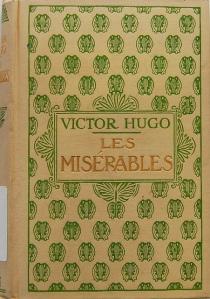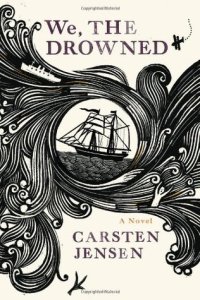Two books face off in a smoky, dirt floored arena filled with the scent and sound of hundreds of sweaty, excited, mostly drunk people.
In one corner, we have Les Miserables, by Victor Hugo. An old veteran to this game, he was first published in 1862, was made famous by the stage musical from Claude-Michel Schönburg, Alain Boublil and Jean-Marc Natel, and called by Upton Sinclair “One of the half-dozen greatest novels of the world.”
In the other corner, we have We, The Drowned, by Carsten Jensen. A newcomer compared to Miserables, he was first published in 2006. I was really fascinated by his title and cover when he first appeared on the unlock screen of my Kindle. Then I saw him in a library I don’t normally visit and just had to introduce myself. Wary of strangers, I looked him up first and decided to proceed in our relationship. He’s become a great friend.
Can Drowned hold his own against the older, stronger Miserables? Can Miserables stand against his younger, more energetic competitor?
OH, THERE’S THE BELL. THE CROWD GOES WILD.
They rush together as only two great cage-fighting books can! Drowned appears to be holding up remarkably well in these early stages, despite having only two-thirds the number of pages! Amazing! Perhaps Miserables is losing some steam to modernity. But no! He throws those extra three hundred pages all over Drowned! How will this end?!
They both appear to be using similar methods in this fight. You know, I never thought about it, but they really use these styles all the time. And are very distinct when you see them apart. But together, man o man! Look at ’em go! To loosely quote the Joker, they are what happens when an unstoppable force meets an immovable object!
Both can be somewhat depressed, though Miserables is more stately in his darkness. In both their lives, there are wars, and terrors untold; good and bad characters; failures, triumphs, and death. Terrible things have happened in these two champs.
WHOA, DID YOU SEE THAT?!?!?! Drowned is taunting Miserables about having a more interesting cover! Can you believe it! This is getting ugly!
I think Miserables might be tiring. He’s superfluous in his movements and muttering about argot and sewers. He just said something about Waterloo. Is he giving up? Did he just predict his own demise?
Perhaps they really are too similar to have a clear winner. It’s hard to call this one, Earl. This could go on forever! The betting windows have never been busier! I predict a few fights in the parking lot after this one.
But they are evenly matched! Both are large books, with similar titles (the Miserables, the Drowned), and in both terrible, horrible, unspeakable things happen to the characters, and yet, both are wonderful books whom I’m glad to know. I think the primary difference, Earl, is in their attitude. Drowned has the downcast outlook of someone who’s been through hell, and Miserables has seen some things. But he’s got hope. I’ve never seen him fight hopelessly or desperately. That might make all the difference. Hope will go a long, long way.
WHAT’S THIS!!!!?!?!!? What is happening? The crowd is on its feet! They’re screaming! What are they screaming at? What’s happening? What? No! What are they doing? Are they really shaking hands?
Ladies and gentlemen, we have a draw! I have never seen this in my long career as a cage-fight announcer! But this is odd! Miserables leaves the ring hopeful as always, head held high, dignity intact. Drowned looks like someone just died, even though it looks like he was the one to initiate the draw. If I didn’t know his story I’d say he was afraid to lose. But that can’t be it, because, like Miserables, he’s seen everything! Perhaps it’s that hope, folks.
This has been Rhoda Marshall, reporting on the most exciting literary fight of my career. I’m proud to know these two books, and I hope you will make their acquaintance.




